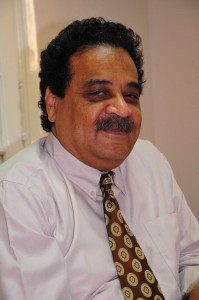
A few hours before starting to write this article, Prime Minister Hazem El-Beblawi’s cabinet resigned. This was expected even if the government was pushed into the resignation. However, El-Beblawi’s — even if it was delayed — was a much better option than being dismissed from his position.
It is believed that the cabinet’s resignation and the rumoured assignment of leadership of the new government to Minister of Housing Ibrahim Mahlab is the third and last stage of the transitional period which is supposed to have started on 30 June after the Muslim Brotherhood was removed from the political scene. The transitional period is supposed to end with the election of the parliament in the summer or early autumn of 2014.
The first stage started with the National Salvation Front (NSF) at the helm and Mohamed ElBaradei as the most famous politician of the transitional stage, even though he never held the position of prime minister, but was satisfied with the vice president position. His presence in the government led to the assignment of Hazem El-Beblawi as prime minister and two other vice presidents from the NSF, namely Ziad Bahaa El-Din and Hossam Eissa, as well as a number of other ministers. This meant that all of the old state’s entities were fine with the democratic movement to be at the forefront of the political scene. The democratic movement was the only political entity that had a convincing political speech against the Brotherhood and, at the same time, was not tarnished with corruption like the old state entities.
At the same time, the 30 June alliance seemed to be coherent even though some of the symbols of the previous regime tried to disband the alliance by launching an attack on the democratic entities, saying that the alliance was unneeded after the fall of the Brotherhood.
The first stage ended with the dispersal of the Brotherhood’s sit-ins at Rabaa Al-Adaweya and Nahda squares, which led to the resignation of ElBaradei. The resignation weakened – to a great extent – the presence of the democratic entities, not only within the government, but also on the political scene. This opened the door for all the symbols of the old state to pounce on the democratic movement and launch an intensified attack on the entire democratic process.
One should note that the number of democratic ministers within the cabinet was only eight – just a quarter of the cabinet. This meant that the entities of the old state allowed the democratic movements to head the political scene as a formality, but they made sure that the symbols of the democratic movement were the weaker partner in the governmental makeup. For instance, the democratic entities were not involved in the assignment of the governors.
The second stage of the transitional period started with the resignation of ElBaradei, followed by the attack on democratic entities. This attack intensified following Bahaa El-Din’s initiative and his stance on the Protest Law. However, the real reason behind the attack was that he belonged to the Egyptian Social Democratic Party, which the old state entities wanted to eliminate from existence. We witnessed how people blamed El-Beblawi and Bahaa El-Din for anything that went wrong in the country, especially any problems relating to the lack of security – even though they had nothing to do with security apparatus in the country. However, symbols of the old state, and especially those who support the former police state, were successful in making the people think that security will never be restored as long as the fifth column – headed by El-Beblawi and Bahaa El-Din – remained in power. They claimed that the pair was blocking the formation of laws and legislations that would enable the security apparatus from doing its job.
Supporters of the police state were successful in making the cabinet issue the flawed Protest Law, which was not supported by any democratic parties or the National Council for Human Rights. El-Beblawi was also pushed into announcing the Brotherhood as a terrorist organisation without a court verdict or a well-researched case. Finally, they were successful in pushing Bahaa El-Din to resign. These successes were the result of months of a fierce attack on the democratic movement as well as human rights and the democratic process.
All of these changes were supposed to bring an improvement to the country’s security, however, this did not happen. Instead, we saw increased bombings.
Now, after the arrest of many of the 25 January youths, the issuing of the Protest Law, and the exclusion of El-Beblawi and other democratic entities, the third – and probably last – stage of the transitional period begins. Currently, people are fed up with the lack of security and stability, so they are starting to long for anyone who can bring back security, even if that means the return of dictatorship. So, let us ask: What is the excuse that the supporters of the old state will use when they almost certainly fail to bring back security? And who will be blamed by the people during the coming few weeks for such failure?


